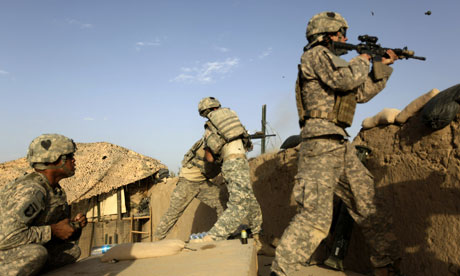Barack Obama to report enough progress for Afghan pullout
![]()
Pentagon Aghanistan troops review will back modest withdrawal in July as Liam Fox agrees to move British troops to Kandahar
Ewen MacAskill in Washington and Richard Norton-Taylor

As Barack Obama prepares to announce a policy review expected to report sufficient progress for a modest pullout of troops from Afghanistan in July, Britain will today announce the deployment of its soldiers to help the US secure a strategic route in the south of the country.
Liam Fox, the UK defence secretary, has agreed to move 120 British infantry soldiers from Helmand to neighbouring Kandahar province. They will help to safeguard Highway One, a main thoroughfare running east-west across what has traditionally been the Taliban’s heartland.
The move was foreshadowed by Fox in testimony to the Commons defence committee, where he also made it clear British public opinion would not countenance an “open-ended commitment” to a military presence in Afghanistan. It was “not likely to command support”, he told the MPs.
British ministers and military commanders broadly echo Washington’s position. They say that while the timing and extent of cuts in the number of troops in Afghanistan should be “conditions-based”, forces could start leaving next summer and British troops will no longer have a ground combat role after 2014. The US president, flanked by his defence secretary, Robert Gates, and secretary of state, Hillary Clinton, is to make a statement in the White House today before the publication of the Pentagon-based review.
Last year he ordered an increase of 30,000 in the number of US troops in Afghanistan, taking the total to 100,000.
Although a decision on the precise number to be withdrawn in July will not be taken until closer to the time, 20,000 could leave without making a significant difference to the conflict, yet be enough to send a signal to the American public that there is an exit strategy, according to an official involved in the discussions.
The White House spokesman, Robert Gibbs, said the report would show progress in halting the momentum of the Taliban, damage to the al-Qaida leadership and greater co-operation from the Pakistani government. But there is still concern over the reliability of the Afghan government and safe havens in Pakistan.
Senior members of the Obama administration have talked up progress over the past few weeks. In Westminster, Fox and two senior advisers told the committee that more children were attending school and corruption was being tackled.
However, Obama’s review, based on a series of Pentagon benchmarks, is at odds with a separate, gloomier report. The US National Intelligence Estimates, which is the collective view of 16 American agencies including the CIA, says the chance of success is limited unless Pakistan tackles safe havens for the Taliban along its side of the border. The New York Times reported the report’s conclusions yesterday, based on interviews with officials.
The Pentagon said the intelligence report was based on information that was out of date and failed to take account of successes over the past few months following the troop reinforcements.
The London-based thinktank Chatham House today warns that corruption and a lack of justice is feeding support for the Taliban. “Political marginalisation has pushed many into supporting the Taliban, while corruption has reached a point where parts of the state have been co-opted by criminal interests,” says the report, No Shortcut to Stability.
“International efforts to address governance in Kandahar ahead of an offensive there have come to little, despite Nato’s officers’ own assertions that military operations would have little point if nothing was done to improve the abusive administration driving much of the insurgency”, it says.
It continues: “Meanwhile the Afghan government has taken policy decisions which actively undermine the rule of law and accountability, and the international response has usually been ineffective. These include presidential pardons of well-connected drug smugglers, rapists and Taliban commanders, moves to neuter key anti-corruption bodies, and the watering down of electoral monitoring months after polls marred by large-scale fraud. President Karzai appears to accept that injustice at the hands of the government has driven many to fight, but not, it seems, the extent of his own responsibility as head of state.”
The Chatham House report adds: “There is a strong argument that durable stability, of the sort that will not require a choice in a few years between renewed intervention and a descent into chaos, in the end requires a minimum degree of justice and legitimacy. One could advance different strategies to achieve this – some of which might include the departure of foreign troops.
“But there should be clarity about the overall strategic aim, and the real balance of risk presented by the different options.”
In Washington, Frank Ruggiero, a career civil servant, replaced Richard Holbrooke, who died on Monday, as special US envoy to Afghanistan and Pakistan.
Related Articles
A Middle Class Revolution
![]()
Tunisians demonstrate against Tunisian President Zine el-Abidine Ben Ali in Tunis on January 14, 2011. © 2011 Reuters In
Chomsky: Acciones antiterroristas de EEUU fomentan el terrorismo
![]()
El reconocido lingüista e intelectual estadounidense, Noam Chomsky, declaró que las medidas que ejerce Estados Unidos bajo la lucha
Budapest Experiences A New Wave of Hate
![]()
Europe’s Capital of Anti-SemitismBy Erich Follath DPA Budapest survived fascism and communism and blossomed after the fall of the Iron


